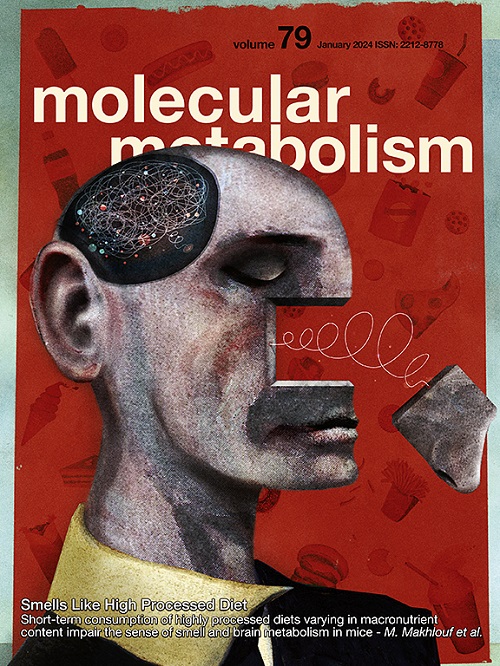Sex-dependent effects of FGF21 on HPA axis regulation and adrenal regeneration after Cushing syndrome in mice
IF 7
2区 医学
Q1 ENDOCRINOLOGY & METABOLISM
引用次数: 0
Abstract
Background
Cushing's syndrome (CS) results from prolonged exposure to excessive glucocorticoids (GCs), leading to metabolic disturbances and adrenal insufficiency (AI). Fibroblast growth factor 21 (FGF21) has shown promise as a potential therapeutic target for metabolic disorders. This study explores the effects of FGF21 on adrenal gland function in a mouse model of AI following chronic hypercortisolism and investigates sex-dependent differences in the hypothalamic-pituitary-adrenal (HPA) axis response.
Methods
We employed a mouse model of AI after chronic corticosterone (CORT) treatment. The effects of recombinant human FGF21 (hFGF21) administration on adrenal function were evaluated in AI mice. Male and female wild-type (WT) and FGF21-overexpressing transgenic (Tg) mice were subjected to 5 weeks of CORT treatment, reaching CS phenotype, followed by immediate analysis or a 10-week recovery period. Metabolic parameters, HPA axis function, and adrenal gland morphology and gene expression were assessed.
Results
Prolonged CORT exposure resulted in metabolic disturbances and HPA axis dysregulation. hFGF21 treatment increased CORT and ACTH secretion in AI mice. FGF21 overexpression influenced glucose homeostasis and insulin regulation during CORT treatment and recovery, with sex-specific effects. Tissue-specific regulation of Klb expression was observed across the HPA axis, with distinct patterns between males and females. Tg mice displayed altered adrenal progenitor cell activation and steroidogenic gene expression. Sex-specific differences were observed in adrenal capsule remodeling and gene expression patterns during recovery.
Conclusions
This study reveals the complex interplay between FGF21 signaling and GC-induced metabolic and endocrine changes, suggesting a potential sex-specific role of FGF21 in metabolic regulation and HPA axis recovery following after CS.

FGF21对小鼠库欣综合征后HPA轴调节和肾上腺再生的性别依赖性影响。
背景:库欣综合征(Cushing's Syndrome, CS)是由于长期暴露于过量的糖皮质激素(GCs),导致代谢紊乱和肾上腺功能不全(AI)。成纤维细胞生长因子21 (FGF21)有望成为代谢紊乱的潜在治疗靶点。本研究探讨了FGF21对慢性高皮质醇血症小鼠模型肾上腺功能的影响,并研究了下丘脑-垂体-肾上腺(HPA)轴反应的性别依赖性差异。方法:采用慢性皮质酮(CORT)治疗后的小鼠AI模型。我们研究了重组人FGF21 (hFGF21)给药对AI小鼠肾上腺功能的影响。然后,我们研究了雄性和雌性野生型(WT)和fgf21过表达转基因(Tg)小鼠,经过5周的CORT治疗达到CS表型,然后立即进行分析或10周的恢复期。我们评估了代谢参数、HPA轴功能、肾上腺形态和基因表达。结果:长期暴露于CORT导致代谢紊乱和HPA轴失调。hFGF21使AI小鼠的CORT和ACTH分泌增加。在CORT治疗和恢复期间,FGF21过表达影响葡萄糖稳态和胰岛素调节,并具有性别特异性效应。在HPA轴上观察到Klb表达的组织特异性调节,在雄性和雌性之间具有不同的模式。Tg小鼠表现出肾上腺祖细胞活化和类固醇基因表达的改变。在恢复期间,观察到肾上腺被膜重塑和基因表达模式的性别特异性差异。结论:本研究揭示了FGF21信号与gc诱导的代谢和内分泌变化之间的复杂相互作用,提示FGF21在CS后的代谢和HPA中可能具有性别特异性作用。
本文章由计算机程序翻译,如有差异,请以英文原文为准。
求助全文
约1分钟内获得全文
求助全文
来源期刊

Molecular Metabolism
ENDOCRINOLOGY & METABOLISM-
CiteScore
14.50
自引率
2.50%
发文量
219
审稿时长
43 days
期刊介绍:
Molecular Metabolism is a leading journal dedicated to sharing groundbreaking discoveries in the field of energy homeostasis and the underlying factors of metabolic disorders. These disorders include obesity, diabetes, cardiovascular disease, and cancer. Our journal focuses on publishing research driven by hypotheses and conducted to the highest standards, aiming to provide a mechanistic understanding of energy homeostasis-related behavior, physiology, and dysfunction.
We promote interdisciplinary science, covering a broad range of approaches from molecules to humans throughout the lifespan. Our goal is to contribute to transformative research in metabolism, which has the potential to revolutionize the field. By enabling progress in the prognosis, prevention, and ultimately the cure of metabolic disorders and their long-term complications, our journal seeks to better the future of health and well-being.
 求助内容:
求助内容: 应助结果提醒方式:
应助结果提醒方式:


